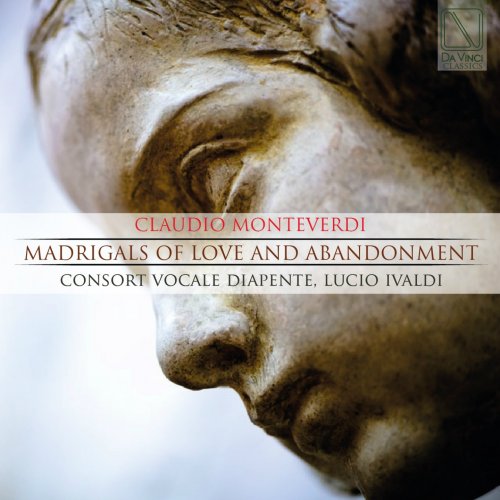
Lucio Ivaldi & Consort Vocale Diapente - Madrigals of Love and Abandonment (2017)
BAND/ARTIST: Lucio Ivaldi, Consort Vocale Diapente
- Title: Madrigals of Love and Abandonment
- Year Of Release: 2017
- Label: Da Vinci Classics
- Genre: Classical
- Quality: FLAC (tracks)
- Total Time: 41:08
- Total Size: 172 MB
- WebSite: Album Preview
Tracklist:
1. Lagrime d'amante al sepolcro dell'amata, SV 111: No. 1, Incenerite spoglie, avara tomba (02:24)
2. Lagrime d'amante al sepolcro dell'amata, SV 111: No. 2, Ditelo, o fiumi e voi ch'udiste (02:01)
3. Lagrime d'amante al sepolcro dell'amata, SV 111: No. 3, Darà la notte il sol (02:29)
4. Lagrime d'amante al sepolcro dell'amata, SV 111: No. 4, Ma te raccoglie, o ninfa (02:55)
5. Lagrime d'amante al sepolcro dell'amata, SV 111: No. 5, O chiome d'or, neve gentil del seno (02:31)
6. Lagrime d'amante al sepolcro dell'amata, SV 111: No. 6, Dunque amate reliquie (03:23)
7. Francesco Tomasi – Libro quarto d'intavolatura di chitarone: Passacaglia in A Minor (Arr. for Lute) (03:42)
8. Lamento d'Arianna, SV 107: No. 1, Lasciatemi morire (01:46)
9. Lamento d'Arianna, SV 107: No. 2, O Teseo, Teseo mio (05:07)
10. Lamento d'Arianna, SV 107: No. 3, Dove, dove è la fede (02:30)
11. Lamento d'Arianna, SV 107: No. 4, Ahi, ch'ei non pur risponde (03:20)
12. Francesco Tomasi – Libro primo d'intavolatura di chitarone: Toccata arpeggiata (Arr. for Lute) (02:37)
13. Madrigali guerrieri, et amorosi, Libro ottavo, SV 161: No. 16, Dolcissimo uscignolo (03:56)
14. Madrigali guerrieri, et amorosi, Libro ottavo, SV 162: No. 17, Chi vol haver felice e lieto il core (02:21)
1. Lagrime d'amante al sepolcro dell'amata, SV 111: No. 1, Incenerite spoglie, avara tomba (02:24)
2. Lagrime d'amante al sepolcro dell'amata, SV 111: No. 2, Ditelo, o fiumi e voi ch'udiste (02:01)
3. Lagrime d'amante al sepolcro dell'amata, SV 111: No. 3, Darà la notte il sol (02:29)
4. Lagrime d'amante al sepolcro dell'amata, SV 111: No. 4, Ma te raccoglie, o ninfa (02:55)
5. Lagrime d'amante al sepolcro dell'amata, SV 111: No. 5, O chiome d'or, neve gentil del seno (02:31)
6. Lagrime d'amante al sepolcro dell'amata, SV 111: No. 6, Dunque amate reliquie (03:23)
7. Francesco Tomasi – Libro quarto d'intavolatura di chitarone: Passacaglia in A Minor (Arr. for Lute) (03:42)
8. Lamento d'Arianna, SV 107: No. 1, Lasciatemi morire (01:46)
9. Lamento d'Arianna, SV 107: No. 2, O Teseo, Teseo mio (05:07)
10. Lamento d'Arianna, SV 107: No. 3, Dove, dove è la fede (02:30)
11. Lamento d'Arianna, SV 107: No. 4, Ahi, ch'ei non pur risponde (03:20)
12. Francesco Tomasi – Libro primo d'intavolatura di chitarone: Toccata arpeggiata (Arr. for Lute) (02:37)
13. Madrigali guerrieri, et amorosi, Libro ottavo, SV 161: No. 16, Dolcissimo uscignolo (03:56)
14. Madrigali guerrieri, et amorosi, Libro ottavo, SV 162: No. 17, Chi vol haver felice e lieto il core (02:21)
A quick look at Claudio Monteverdi, who lived between ‘500 and ‘600 serving the Gonzagas in Mantua and then Master of the Chapel of San Marco in Venice. In the last years of the sixteenth century, he theorised a style called “seconda prattica”, as opposed to “prima prattica”, represented by the liturgical music style and by the secular music–especially that of the first half of the century–based on formal rules and forms related to the content of the text.
Seconda prattica can be set in the context of a dispute between “the ancient” and “the modern”, which was taking place in those ardent years especially in Florence that wanted to revive the Declamation of the ancient Greek theatre in a modern affections theory with the aim of harmonizing music and text. In fact, starting from these premises, the century saw the vertiginous development of musical theatre.
Seconda prattica can be set in the context of a dispute between “the ancient” and “the modern”, which was taking place in those ardent years especially in Florence that wanted to revive the Declamation of the ancient Greek theatre in a modern affections theory with the aim of harmonizing music and text. In fact, starting from these premises, the century saw the vertiginous development of musical theatre.
Year 2017 | Classical | FLAC / APE
As a ISRA.CLOUD's PREMIUM member you will have the following benefits:
- Unlimited high speed downloads
- Download directly without waiting time
- Unlimited parallel downloads
- Support for download accelerators
- No advertising
- Resume broken downloads


